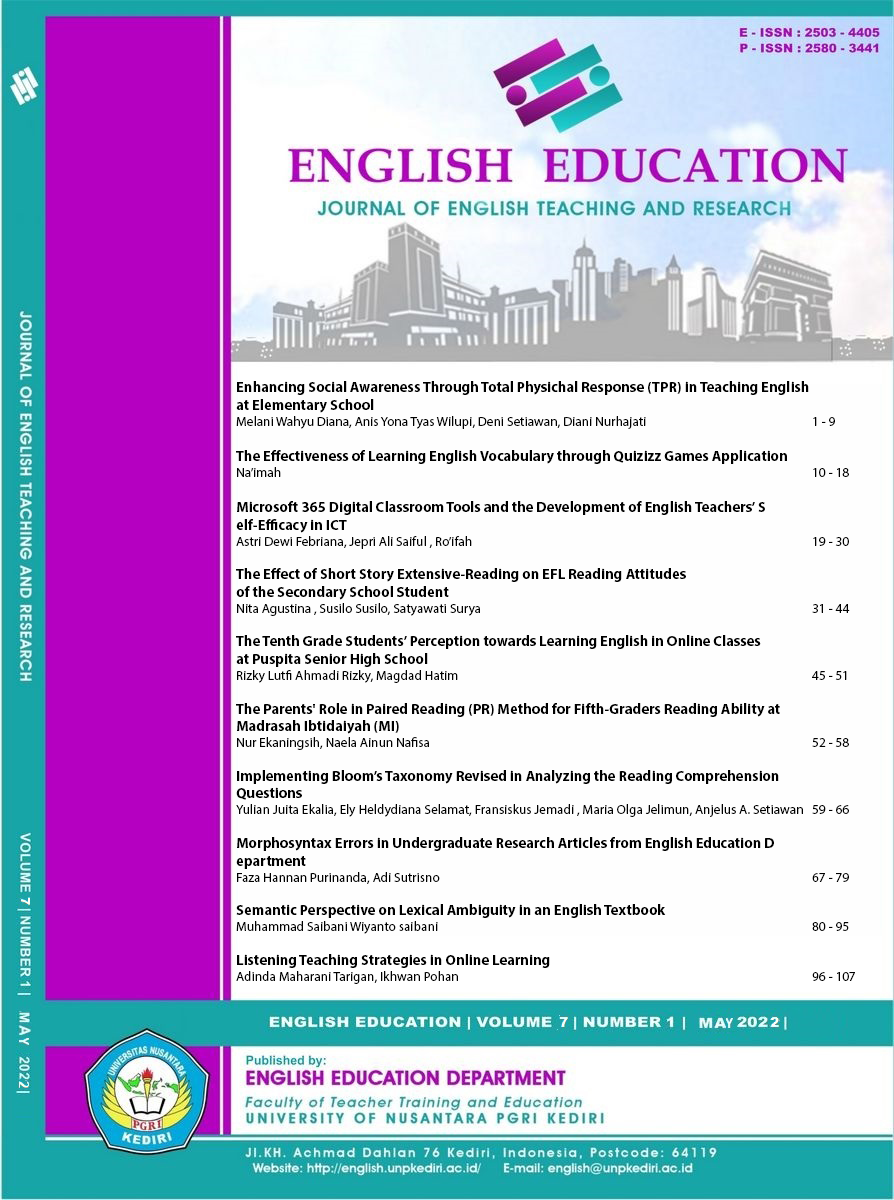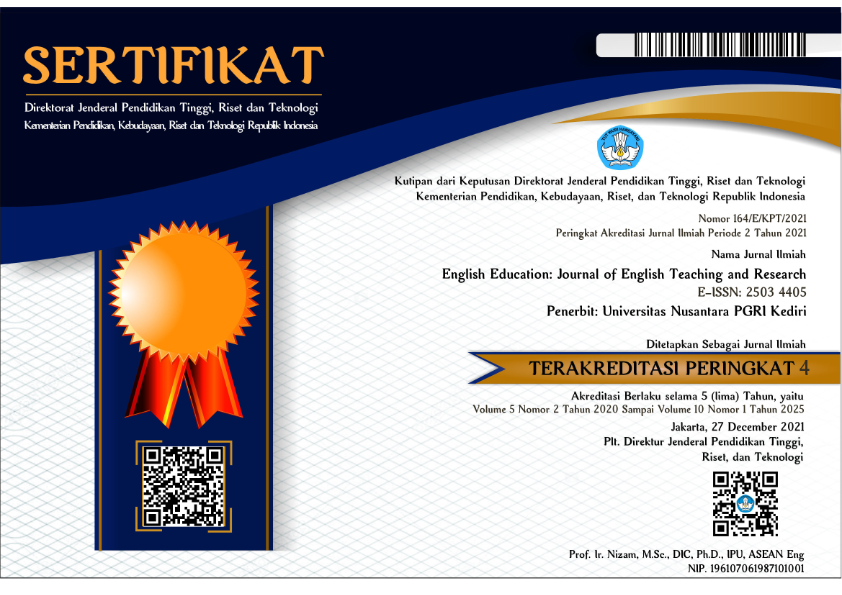Microsoft 365 Digital Classroom Tools and the Development of English Teachers’ Self-Efficacy in ICT
DOI:
https://doi.org/10.29407/jetar.v7i1.17784Keywords:
English language teaching, ICT, Microsoft 365, teacher self-efficacyAbstract
Present scholarship informs that teacher self-efficacy is in nexus with the quality of teaching. Thus, this study considers the issue of teacher self-efficacy in English teaching, particularly concerning ICT. It aimed at examining whether the English teachers’ self-efficacy in ICT can be developed by using effective strategies of Microsoft 365 digital classroom tools in teaching English. The study employed a mix-method analysis with a congruent mixed-method design. The participants were three female and one male English teachers teaching English in elementary schools. They all received educational intervention on the practical strategies of using Microsoft 365 digital classroom tools. Closed-ended questionnaire was used to get quantitative data and it was administered before and after the teachers received the intervention. The data from the questionnaire were analyzed quantitatively through mean comparison. Besides, an interview was used to get qualitative data which were analyzed thematically. The quantitative result showed the mean comparison between pre and post-test: the post-test mean score was higher (M = 3.18) than pre-test (M = 2.71). The qualitative data indicated that the participants’ efficacy for instructional strategies, classroom management, and student engagement were getting better. In short, both quantitative and qualitative showcase that the self-efficacy of the teachers in ICT was developed when they implemented the Microsoft 365 Digital Classroom Tools.
Keywords: English language teaching, ICT, Microsoft 365, teacher self-efficacy
Downloads
References
Amirullah, G., & Maesaroh, M. (2020). Pelatihan Pengembangan Kelas Digital Berbasis Microsoft 365 Di Sekolah Muhammadiyah Dki Jakarta. Community Development Journal : Jurnal Pengabdian Masyarakat, 1(3), 223–227. https://doi.org/10.31004/cdj.v1i3.932
Bandura, A. (1977). Self-efficacy: Toward a unifying theory of behavioral change. The self in social psychology. In Psychological review (Vol. 84, Issue 2). Stanford University. https://doi.org/10.1037//0033-295x.84.2.191
Bureau of Communication and Public Service & Culture. (2020). Mendikbud Terbitkan SE tentang Pelaksanaan Pendidikan dalam Masa Darurat Covid-19. Www.Kemdikbud.Go.Id.
Carrillo, C., & Flores, M. A. (2020). COVID-19 and teacher education: a literature review of online teaching and learning practices. European Journal of Teacher Education, 43(4), 466–487. https://doi.org/10.1080/02619768.2020.1821184
Dawadi, S., Shrestha, S., & Giri, R. (2021). Mixed-Methods Research: A Discussion on its Types, Challenges, and Criticisms. Journal of Studies in Education, 2, 25–36.
Gao, L. X., & Zhang, L. J. (2020). Teacher Learning in Difficult Times: Examining Foreign Language Teachers’ Cognitions About Online Teaching to Tide Over COVID-19 . In Frontiers in Psychology (Vol. 11, p. 2396). https://www.frontiersin.org/article/10.3389/fpsyg.2020.549653
George, S. V., Richardson, P. W., & Watt, H. M. G. (2018). Early career teachers’ self-efficacy: A longitudinal study from Australia. Australian Journal of Education, 62(2), 217–233. https://doi.org/10.1177/0004944118779601
Hatlevik, I. K. R., & Hatlevik, O. E. (2018). Examining the Relationship Between Teachers’ ICT Self-Efficacy for Educational Purposes, Collegial Collaboration, Lack of Facilitation and the Use of ICT in Teaching Practice . In Frontiers in Psychology (Vol. 9, p. 935). https://www.frontiersin.org/article/10.3389/fpsyg.2018.00935
Hoang, T., & Wyatt, M. (2021). Exploring the self-efficacy beliefs of Vietnamese pre-service teachers of English as a foreign language. System, 96(December). https://doi.org/10.1016/j.system.2020.102422
Lailiyah, M., & Cahyono, B. Y. (2017). Indonesian EFL Teachers’ Self-Efficacy towards Technology Integration (SETI) and Their Use of Technology in EFL Teaching. Studies in English Language Teaching, 5(2), 344. https://doi.org/10.22158/selt.v5n2p344
Pu, H. (2020). Implementing online ELT in the time of crisis: Ordeal or opportunity? ELT Journal, 74(3), 345–348. https://doi.org/10.1093/elt/ccaa030
R. K. Bsharat, T., & Behak, F. (2021). The Impact of Microsoft Teams’ App in Enhancing Teaching- Learning English during the Coronavirus (COVID-19) from the English teachers’ perspectives’ in Jenin city. Malaysian Journal of Science Health & Technology, 7, 102–109. https://doi.org/10.33102/mjosht.v7i.116
Sakız, H., Ekinci, A., & Sarıçam, H. (2019). Teachers’ perceptions of their school managers’ skills and their own self-efficacy levels. International Journal of Leadership in Education, 23(5), 585–603. https://doi.org/10.1080/13603124.2018.1562094
Tschannen-Moran, M., & Hoy, A. W. (2001). Teacher efficacy: capturing an elusive construct. Teaching and Teacher Education, 17(7), 783–805. https://doi.org/10.1016/S0742-051X(01)00036-1
Zee, M., & Koomen, H. M. Y. (2016). Teacher Self-Efficacy and Its Effects on Classroom Processes, Student Academic Adjustment, and Teacher Well-Being: A Synthesis of 40 Years of Research. Review of Educational Research, 86(4), 981–1015. https://doi.org/10.3102/0034654315626801
Zee, M., Koomen, H. M. Y., & de Jong, P. F. (2018). How different levels of conceptualization and measurement affect the relationship between teacher self-efficacy and students’ academic achievement. Contemporary Educational Psychology, 55, 189–200. https://doi.org/https://doi.org/10.1016/j.cedpsych.2018.09.006
Downloads
Published
Issue
Section
License
Authors who publish with this journal agree to the following terms:
- Copyright on any article is retained by the author(s).
- The author grants the journal, the right of first publication with the work simultaneously licensed under a Creative Commons Attribution License that allows others to share the work with an acknowledgment of the work’s authorship and initial publication in this journal.
- Authors are able to enter into separate, additional contractual arrangements for the non-exclusive distribution of the journal’s published version of the work (e.g., post it to an institutional repository or publish it in a book), with an acknowledgment of its initial publication in this journal.
- Authors are permitted and encouraged to post their work online (e.g., in institutional repositories or on their website) prior to and during the submission process, as it can lead to productive exchanges, as well as earlier and greater citation of published work.
- The article and any associated published material is distributed under the Creative Commons Attribution-ShareAlike 4.0 International License








 Article template
Article template



